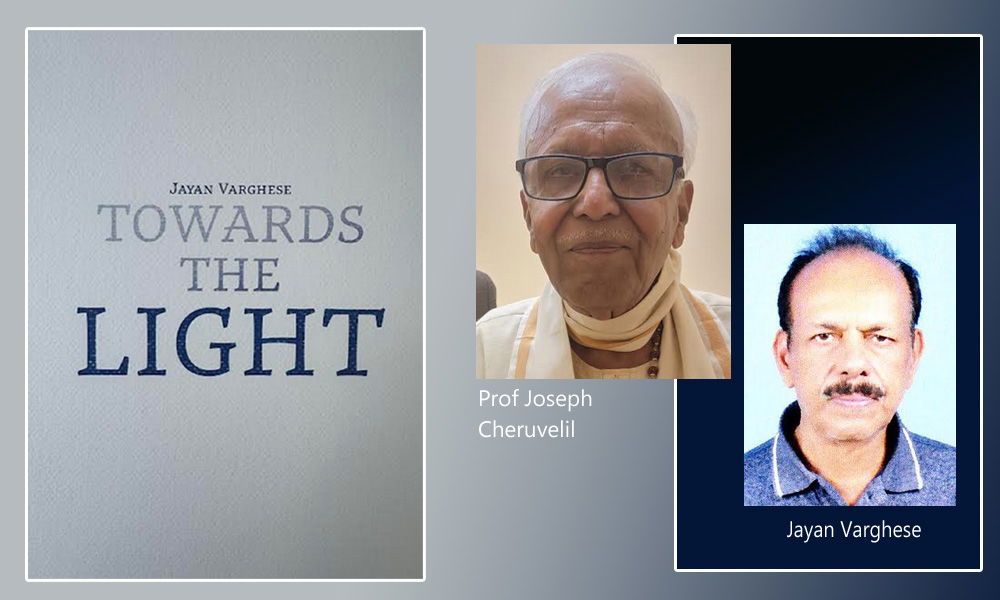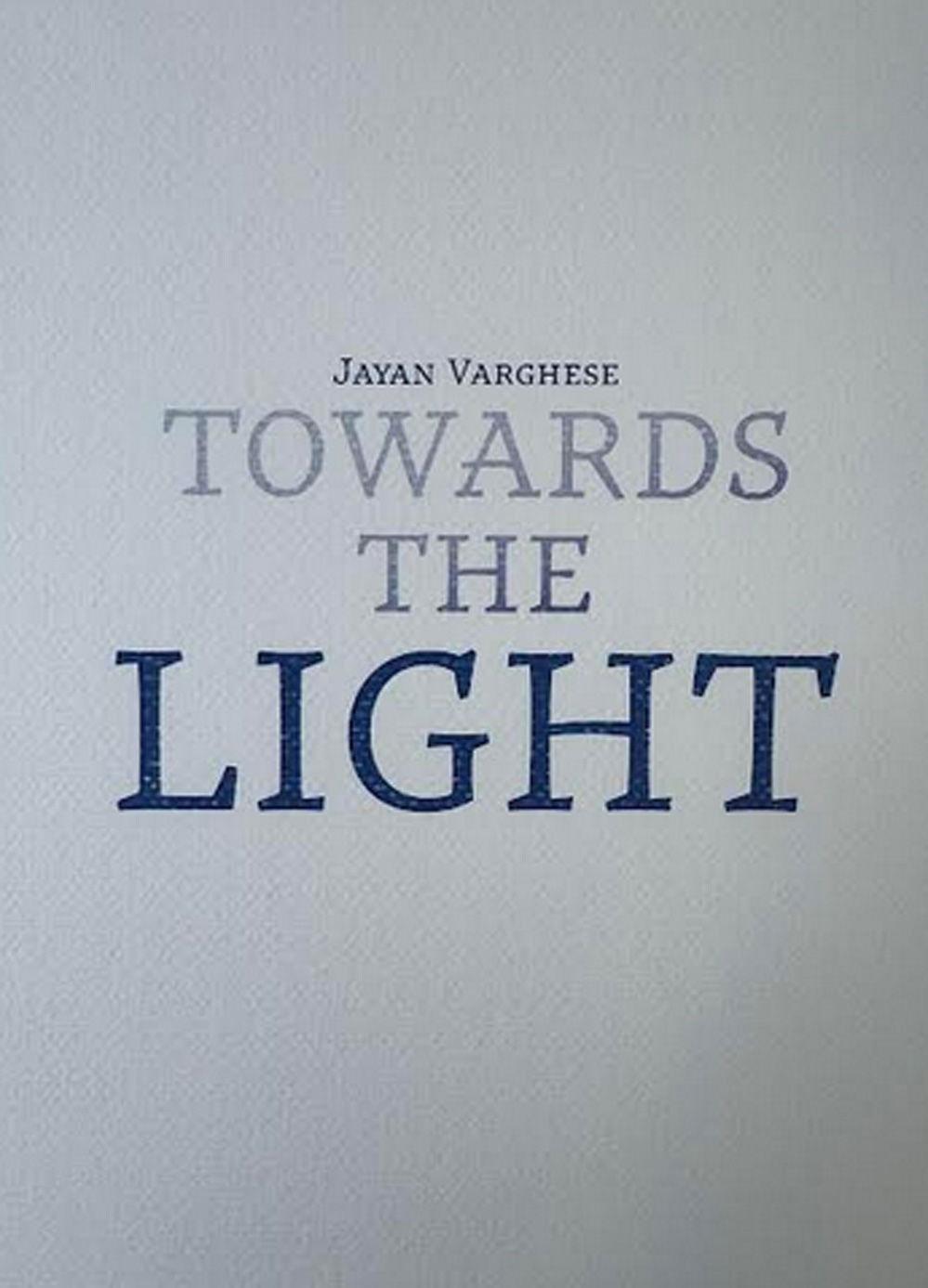Jayan Varghese’s play ‘Towards The Light’ (A tribute by Prof Joseph Cheruvelil)

(Joseph Cheruvelil is retired professor of English at St. John’s University, New York)
In the beginning, long before the Big Bang, God said, “Let there be Light.“ And there was light (Genesis 1:3). If there is any mystery in the universe, it is in light and water. In fact, they are the most frequently used symbols in religion, art and especially in literature. Albert Einstein theorized that nothing could travel faster than light. I wish I could tell him that in a split second my mind can dash back to my ancestral home in Kerala, browse through all the old moth-eaten books on the rustic shelf in my small bedroom and come back to my home in Queens. I can even go to the farthest end of the kosmos and return in a second!
We often use the word light to represent everything from God’s benevolence to man’s never ending pursuit of enlightenment and enrichment. The Upanishads used it most succinctly in the famous verse “Thomasoma jyothir gamaya,“ “Oh Lord, from darkness lead me to light.” This is the theme, message and mantra of Jayan’s allegorical play.
Like, yet unlike the morality plays of the middle ages, which followed the passion plays and pater noster plays of monastic monks, and featured personified abstractions as in Everyman, Towards The Light presents tableaux of life where strong-willed souls tear off their age-old fetters, pulverize granite roadblocks, and liberate themselves to pursue their dreams. They challenge and defeat entrenched bullies and tyrants. Despite brutal torture, and yes, even death, they triumph.
Thomas Carlyle, an eccentric Scottish historian, once observed that “The history of the world is nothing but the biographies of great men.“ Most great men were not born great; nor was greatness thrust upon them. Indeed many of them arose from the salt of the earth and elevated simple chores to Olympian heights. Jayan Varghese is one such lifter, a gifted writer in his native Malayalam. Here in one book, published in New York, he juxtaposes the same drama in two languages, something that never happened before, at least as far as I know. He is fluent in Malayalam, though he had very little formal schooling. Because of his family’s financial limitations, he was forced to drop out of school and work to earn his keep. He did not have the opportunities for fun and games which most of us take for granted. However, relying on his own inner strength, he overcame the humiliations and embarrassments of poverty, smashed the confining and crippling walls all around him and raised his proud head over the landscape, and even beyond the horizon. His play presents slices of his heroic struggles in flesh, blood and marrow.
The actions and dialogues in Towards the Light remind me of some of the scenes in the Theater of the Absurd plays which became popular during the half century between the ashes of Hiroshima and the debris of the sledge-hammered Berlin Wall. I am not a great admirer of those plays because I am a classical realist, uncomfortable with moon-struck romanticists. I have little patience with foggy themes, symbolic stories, characters with multiple personalities, stream of consciousness narrations and peeled-onion endings. I prefer stories with a beginning, middle and end, I cherish simplicity over organized chaos.
Though I have wrestled with Samuel Beckett’s Waiting for Godot, Jean Genet’s Balcony, Eugene Ionesco’s Rhinoceros and several other plays of that genre, I am still not sure about their substance and style, even purpose (one exception is Edward Albee’s Who’s Afraid of Virginia Woolf). I know that life is a complex phenomenon, that human existence is a kind of tragi-comedy, and that faith and reason always play hide and seek. Should literature entertain and educate us or should it confound us and make us feel worthless? The answer is obvious.
Long ago when I was a graduate student at Ole Miss, a friend of mine who was doing his Ph.D in experimental psychology, described Samuel Beckett and company as “Psychoceramics,“ a word he coined to mean crackpots. During the turbulent sixties, I encountered dozens of them at the West End, a popular bar and grill on Broadway near Columbia University. That eatery was the watering hole of counter-culture demonstrators, armchair revolutionaries, political activists, philosophical anarchists, existentialists, atheists, agnostics, Cafeteria Catholics, Hare Krishna devotees, half-naked narcissists, naive idealistic hippies, yippies, supercilious weirdos to name a few. They challenged my conservative views and entertained me.
Now, after years of living in New York have made me a pragmatic restless yankee, after much snow fell over my roof and turned all my hair snow-white, I still, without rhyme or reason have nostalgic memories of the fun, frolic and foolishness of those days. Who knows? The absurd may be an integral part of our psyche.
At the dawn of civilization, when man began to speculate about the beyond, he created anthropomorphic gods and built massive shrines to honor them. He constructed the granite Angkor Wat in Cambodia and the marble parthenon in Greece. In Egypt, the Pharaoh proclaimed himself a god and carved Abu Simbel to perpetuate his glory. What began as fear of the wrath of gods evolved into love and loyalty to a loving God. Eventually, a love-hate relationship replaced the original sentiments. And still later, God was perceived as jealous and dictatorial, a rival to be accommodated and perhaps to be defeated. This contentious attitude often resulted in pain and suffering for man and soon the underdog syndrome manifested itself. Though the gods always won, man endured and prevailed.
These encounters, real and imagined, generated several myths and legends about men who defied the gods and became god-men. Thousands of years ago, India venerated two superhuman tragic heroes who triumphed over betrayal, deceits and death and entered heaven like conquering heroes: the handsome Karna, sired by the sun-god himself, and adorned from birth with gold and the nine precious stones butchered in deceit by pious potentates became forever the iconic symbol of unselfish love and loyalty while the princely Duryodhanan, with his cast iron body and will of steel emerged as the perfect Kshetriyan idol of fighting in the field until the last drop of his blood oozed into the soil.
The classical period of the Greeks and Romans created heroes whose indomitable will and god-like bodies threatened the gods. Titans like Prometheus, Atlas and Hercules invaded the heavens and brought fire to man which enabled him to smelt iron and build civilization. They suffered beyond their most dreaded fears, but persisted in their philanthropy. Their statues at Rockefeller Center in Manhattan still elicit our adulation.
In the seventeenth century the poet Milton, endowed with imperial intellect, depicted Lucifer, aka Satan as the ultimate icon of man defying God and challenging the other fallen angels to build a heaven in hell. The eighteenth century saw the emergence of a popular hero known as a picaro, an unabashed hedonist who sought sensual pleasures and instant gratification as religious obligations. A century later he metamorphosed into what became known as the Byronic hero. Still later he appeared as George Bernard Shaw’s Superman with god-like attributes. In mid-nineteenth century Ralph Waldo Emerson pontificated the doctrine of the ‘infinitude of the individual.’
We see this superman reincarnated in Jayan’s Towards the Light with a new name: Navan. He is a mexican jumping bean with unceasing energy and unfailing resolve. His words echo those of John the Baptist and Jesus. He is the new phoenix of the millennium. Prophets and messiahs are frequent visitors to this green earth as exemplified in the nine incarnations of Mahavishnu. Despite all their missions, each one of us finds ourselves at point zero. Our challenges are the same, only the details are different. Each one of us has to reincarnate ourselves. The earth spins without stop. We have to stop spinning. We may feel dizzy, but we shall regain equilibrium if we persist. We can learn from Navan.
From Bhasa, Kalidasa through Sophocles, Seneca, Shakespeare, Moliere, Ibsen, Shaw, O’Neill, Miller, et al, playwrights have endeavored to expose us to ourselves. Hamlet exclaimed that life is “a tale told by an idiot.” Jayan Varghese deserves our kudos for reaffirming our humanity and divine sparks. Three cheers to him, also to Eldhose, his son, who translated the play into English. As they say, the apple doesn’t fall too far from the tree. Vithu gunam pathu gunam.
I conclude with two lines from a poem by John Henry Cardinal Newman: Lead kindly, Light, amidst the encircling gloom, Lead Thou me on. The night is dark, and I am far from home, Lead Thou me on.






